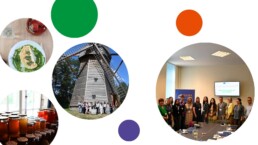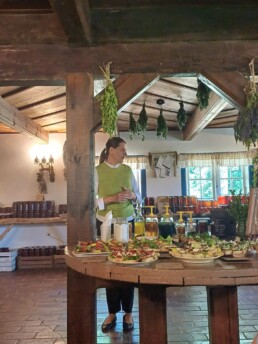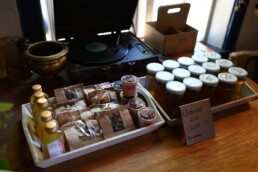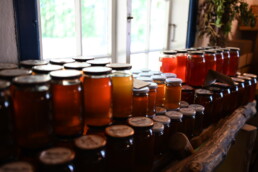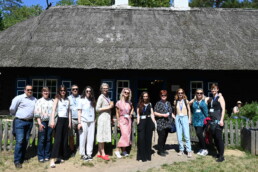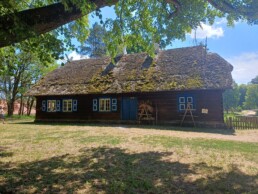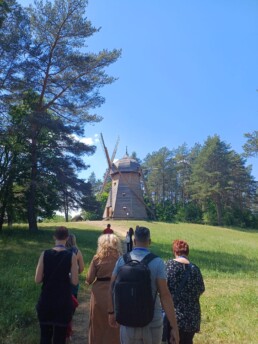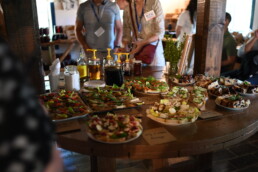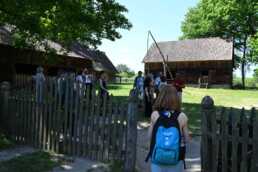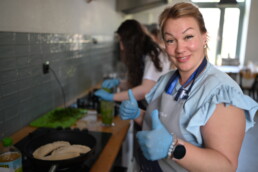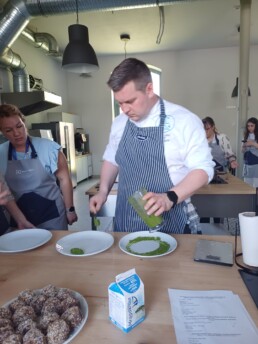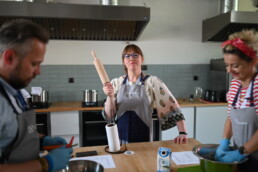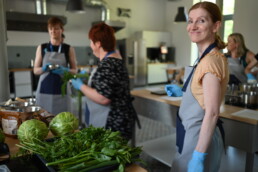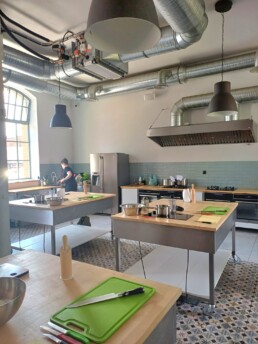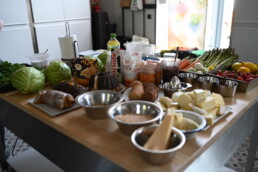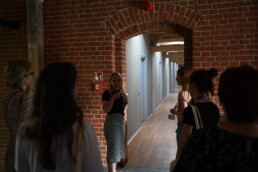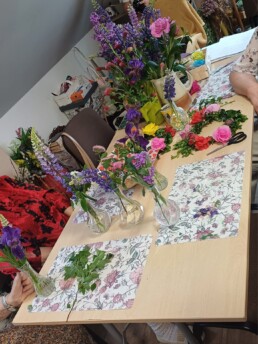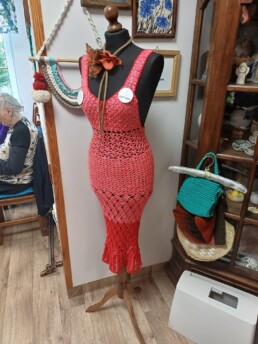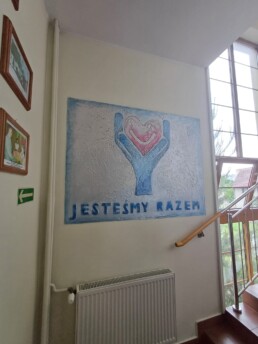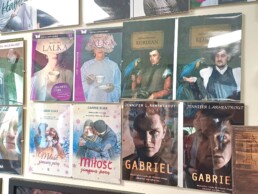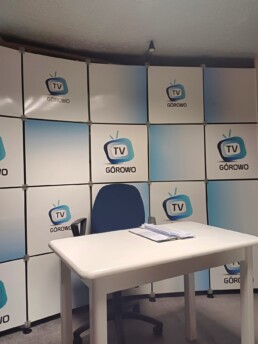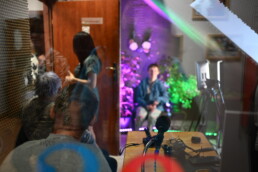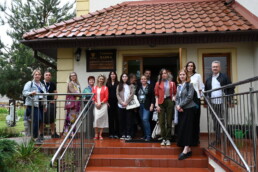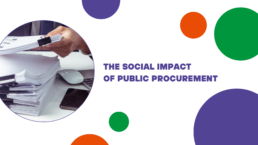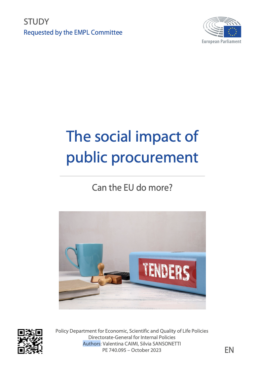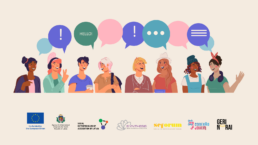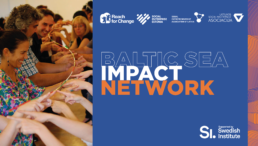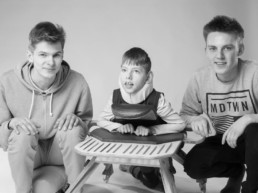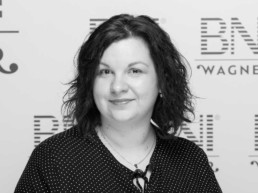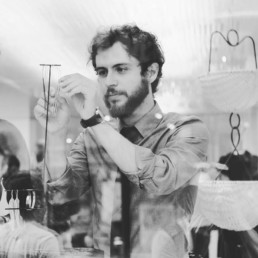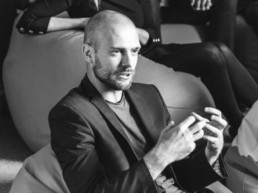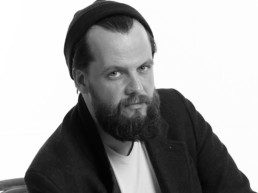SEAL members' experience exchange trip to Olsztyn, Poland
From May 20 to 24, an experience exchange trip took place in the city of Olsztyn in the northern region of Poland, bringing together representatives from three countries: Social Entrepreneurship Association of Latvia, social entrepreneurship association in Poland WAMA-COOP, and social enterprise in Slovenia KNOF. Three LSUA members participated in the trip, representing social enterprises from Latvia: Jānis Broks from the day center “Oasis of Life”, Agnese Gaidelione from the green lifestyle store “Pour in.lv,” and Ilze Saulāja from the Support and Development Center “TOGETHER”.
This trip was organized as part of the Erasmus+ project “Think globally, act locally – international partnership for effective social entrepreneurship education” and during these days, we visited:
- The day center for seniors and people with mental or physical disabilities “We are Together”;
- Food Bank;
- The natural food brand “Mazurskie Słoiki”;
- And the social cooperative café “Tradition”.

Olsztynek is a home to a famous ethnographic park that is popular in all Poland, and as the Poles themselves say, every student has gone there on a school trip at least once. In this ethnographic park, nestled among wide meadows and ancient houses, operates the social cooperative “Negocjator,” whose brand “Mazurskie Słoiki” grows natural plants within the park’s territory to create unique products that are in demand among regional restaurants.
The cooperative brings together many local home producers to collectively supply the necessary quantity of products to restaurants. We were given a wonderful opportunity to participate in a tasting and to purchase their special products – various locally made items such as jams, juices and syrups. Particularly noteworthy is the syrup made from rose petals, which, when mixed with water and a slice of lemon, makes an excellent summer lemonade.
Continuing with the theme of food and sustainability, which is one of the main focal points of the project, WAMA-COOP also introduced us to representatives from the food bank. This is an excellent example of how barracks and stables, so necessary during wartime but abandoned in the post-war years, can be transformed to meet modern needs.
Founded in 2000, the “Olsztyn Food Bank” is a non-profit organization with a mission to reduce the amount of food waste. The food acquired by the bank is donated to organizations that support people from at-risk groups. The organization conducts various food education events, such as cooking masterclasses with a chef, in which we also participated.
Each country worked in a group to prepare modern versions of traditional Polish dishes with the help of the chef. As the pots clinked and the smiles grew wider, we observed that this unique experience greatly resonated with our members.
In the “Food Bank” building, not only are cooking masterclasses held, but there are also modern co-working spaces for young entrepreneurs on the second floor. Meanwhile, on the first floor, the “Food Bank” representatives themselves work diligently at their computers, writing new projects and generating ideas.
In the city of Górowo Iławeckie, there is a social cooperative, the canteen “Tradition.” The second floor of the building houses a kindergarten, where the young students also have their daily meals. Social enterprise cooperatives in Poland are an important organizational form, meaning that several enterprises come together, collectively creating ideas and attracting funding. The WAMA-COOP association also participates in the cooperative formation process, providing funding to social entrepreneurs. “Tradition” is one such example.
The most emotional part of this trip was undoubtedly the visit to the day center for seniors and people with mental and physical illnesses, “We are Together.” In this day center, various activities take place every day, similar to a school schedule, where participants learn essential life skills, express their creativity, and enjoy their time in good company. The seniors’ genuine emotions upon seeing us were touching. Even though we spoke different languages, the language barrier in such situations is not felt, and the warmth and genuine joy are understood without the help of a translator.
The day center is free for it’s clients, and it also offers the possibility to stay overnight if needed. Daily, the center hosts various workshops where instructors teach how to cook, use a computer, create various items and souvenirs using handicraft techniques, and other skills. The most surprising feature was the television and radio studio, where, under the guidance of a journalist, the center’s residents prepare radio news and television segments that have been broadcasted on public media and are now available online. Additionally, the day center conducts professional themed photoshoots where residents dress up as characters from movies and fairy tales.
During the exchange trip, we not only visited various social enterprises but also met with local municipalities. The mayor of Olsztynek actively collaborates with the social entrepreneurship association WAMA-COOP and focuses on youth engagement and development opportunities. Meanwhile, small towns like Górowo Iławeckie join international networks with small towns from other countries to gain additional funding for improving the city’s and residents’ quality of life. Both visits demonstrated that the personalities of the people working in the municipality are a crucial factor in the development of the entire municipality, including the social entrepreneurship sector.
SEAL members after the trip acknowledged that they gained valuable insights and contacts, as well as the firsthand experience of good practices, which will be beneficial for the future development of their own businesses. Additionally, it provided extra motivation and energy for future endeavors.
Here are some quotes from the entrepreneurs themselves, translated in english:
“Thankful for the experience and excellent organization, as well as for introducing us to other entrepreneurs. We are taken care of and enjoying the process.”
I feel overwhelmed and pampered like a queen. My mind is finally free from work and daily routines, but ideas… ideas flow abundantly and I can barely keep up with jotting them down. Deeply grateful for this opportunity.
We observed that potential collaborations among entrepreneurs were discussed, with one member gaining motivation to enroll in an English language course and others creating social media profiles for their businesses and discussing marketing and financial strategies. Members acknowledged that this journey was also necessary for their mental well-being – to understand that they are not alone in facing challenges in running and maintaining their businesses. Often, mutual psychological support is the most crucial.
The trip also showed that Poles have generous hearts. Just as generous as the portions of their food 🙂 In the fall, it will be our turn to show hospitality to our project partners from Poland and Slovenia. This was the first on-site visit of the project. Since last year, we had only “met” each other through emails and video calls. In the fall, the second meeting of all three countries is planned – this time in Riga, and next year – in Slovenia. The goal of the trips is for social entrepreneurs from all three countries to gain new insights, knowledge, and contacts, as well as to adopt best practices for the future development of their own businesses.
———————————————————-
This trip took place within the framework of the “Think globally, act locally – international partnership for effective social entrepreneurship education” project, co-funded by the European Union’s Erasmus+ program.

The social impact of public procurement - can the EU do more?
The aim of this study is to present the possibilities offered by Directive 2014/24/EU on public procurement for the achievement of social goals and to analyse how these possibilities have been transposed into national law and implemented by contracting authorities across the EU. Another aim is to identify obstacles to the use of existing provisions and make recommendations with regards to possible future EU action.
This document was provided by the Policy Department for Economic, Scientific and Quality of Life Policies at the request of the Committee on Employment and Social affairs (EMPL Committee).
Seven years after its entry into force, it is legitimate to wonder what kind of social impact this Directive might have produced and to what extent SRPP is used in the EU. Until now, there has been no evaluation of this Directive from the European Commission. This study attempts to fill this gap and provide some answers on the state of play of SRPP in the EU.
5 useful steps to create cooperations between local governments and community organisations
Successful cooperation and the creation of meaningful synergies between local authorities and community organisations is an effective way to improve the quality of life and well-being of local people, while creating new opportunities in the area.
By exploring good practices in several European countries – Latvia, Lithuania, Sweden, Portugal and Cyprus – and examining examples that should be avoided, various actions and steps for developing an effective approach to cooperation are summarised in the report “Tools for enhancing cooperation between local governments and community-based youth organisations“. Benefits of strong collaborative practices between local government municipalities and non-governmental organisations are manyfold and well-recognised, and should benefit all involved parties, including community organisations, municipalities, and intermediate organisations.
The report starts by describing the results of a needs analysis to help understand the challenges and needs related to building cooperation between community-based organisations working with young people or aiming to improve young people’s lives and local authorities. Next, the steps to develop a shared vision when forming a partnership are identified.
Five steps to help build meaningful and sustainable cooperations:
- Define and articulate a common outcome
- Establish mutually reinforcing or joint strategies
- Agree on roles and responsibilities
- Establish compatible policies, procedures and other means to operate across organisational boundaries
- Develop mechanisms to monitor, evaluate, and report on results.
Furthermore, local authorities can support NGOs and local social enterprises through financial relationships: funding, grants and subsidies or even through service contracts (public procurement), but also by providing government resources, consulting and other creative ways of cooperation. The report examines the following legal forms of cooperation:
- Public procurement of services
- The municipality provides space and resources
- Project funding
For each of these steps and types of cooperation explanations, suggestions and useful resources to help to prepare for cooperation, as well as examples of partnerships between different organisations are offered.
At the end of the report, potential issues in forming a partnership are discussed, and how to avoid them so that the experience of working together is a positive one for all parties involved.
Read more about cooperation between local authorities and community-based organisations HERE.
The above mentioned outputs were created in the context of the project “Enhancing youth capacity in municipalities and encouraging mutual cooperation using social entrepreneurship as a tool, LOCAL-Y-MPACT” The objective of the project “LOCAL-Y-MPACT” is to strengthen the cooperation between community based youth organisations and social enterprises and local municipalities, and promoting social entrepreneurship as an effective tool for reducing economic inequality, promoting social inclusion and integration, creating resilient society and fostering active participation within local communities.


Toolbox available in:
Greek
Latvian
Lithuanian
Portuguese
Swedish
New peer learning network for Swedish-Baltic social entrepreneurs
Reach for Change Sweden, Social Enterprise Estonia Estonia, Social Entrepreneurship Association Latvia and the Lithuanian Social Business Association will pilot The Baltic Sea Impact Network - a new transnational network for peer learning between social entrepreneurs from the Baltic Sea region.
The network is one of the 23 cooperation projects in the region supported with seed funding by The Swedish Institute. All four organizations collaborating on the project have years of experience in supporting social entrepreneurs and have proven their ability to mobilize entrepreneurs and stakeholders at a national level in their respective countries.
“The obstacles faced by social entrepreneurs are largely comparable across the wider Baltic Sea region - they struggle with a lack of specialized funding, low visibility, and few opportunities for long-term capacity building. Our joint experience has proven that peer network and cooperation opportunities are crucial for the development of social entrepreneurs, as it allows for shared problem-solving and replication of best practices.”, says Kristine Verpeja - Baltic Program and Partnership Manager at Reach for Change and coordinator of the project.
“During the current time of uncertainty, there is an urgent need to support social entrepreneurs and innovators with such cooperation as this. We are happy for this partnership and are going to put possible efforts and resources to make this pilot a success story for a long-lasting format for the future,” shares Viktorija Bražiūnaitė, Director of the Lithuanian Social Business Association.
30 social entrepreneurs from Sweden, Estonia, Latvia and Lithuania will be invited to join the network. They will undergo a self-assessment to best determine their needs and interests, and over the course of 13 months they will be guided through a programme of monthly peer learning sessions and expert workshops (for ex. with public sector authorities, corporates, impact investors). In August 2023, all network members will be invited to meet in-person in Riga, Latvia for the project’s final event.
The aim is to help the network members learn new skills, connect with like-minded peers from neighboring countries and increase the access of social entrepreneurs to relevant stakeholders.
The ongoing feedback by the network members will assist the consortium partners in adjusting the network model and gathering initial results on its impact. The long-term ambition would be to formalize the concept, pitch it for further funding, and eventually replicate and expand it across additional markets in the Nordic region and wider Europe.

